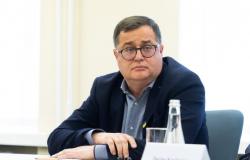Frightened by spies that his parents would be sentenced to long years in prison, the soldier refused to continue fighting for Ukraine and left for Vilnius. However, the soldier was killed on the trip when his broken down car was hit by a truck at night in Lithuania.
Several more soldiers who were unmasked by Lukashenka’s spies left the Belarusian regiment in Ukraine due to threats to put their parents in prison. The dictator’s threats are not out of hand, because Minsk has declared the Belarusian regiment named after K. Kalinauskas, founded in Kyiv, as a terrorist organization and threatens to mercilessly punish its members and supporters.
For these reasons, the procedure for those who want to join K. Kalinauskas’ regiment was tightened, and those accepted were forbidden to communicate with journalists and distribute information on the Internet. I learned about this only after I was severely reprimanded by the soldiers when I came to the funeral of a Belarusian soldier.
“Turn off the camera, you can’t take photos and videos here, and who are you and how did you get here, how did you find out about our funeral,” the slender blonde girl sternly ordered after jumping up quickly and started asking questions. Since there were two muscular guys with masked faces standing next to her, I didn’t dare to object and turned off the camera on my phone.
“Show me what you took a picture of and delete everything immediately,” the girl continued to speak in a commanding tone and did not lower her stern, searching gaze. Since I had managed to take only five photos, I deleted them and explained who had reported the secret funeral of the soldier, then the girl with two attendants went closer to the coffin.
Just when I was thinking that I could continue watching the funeral calmly and write down my impressions in a notebook, another large masked guy approached me. After checking whether I had followed all the girl’s instructions, he asked me to explain to him how I got to the funeral. After learning the middleman’s last name, the guy responded, but ignored the request to tell about the dead soldier and about himself, and advised him to come after the funeral. At the end of the ceremony, the man did not want to speak, warned not to write about the place and circumstances of the soldier’s death, sat with several comrades in a military SUV and smoked.
All of the dozen soldiers questioned refused to speak: those with their faces covered and a few without masks. “Did you fall from the moon, don’t you know what’s happening in Belarus, don’t you understand that after learning the names of those who fought here, Lukashenka will repress their parents, and relatives and friends may also experience trouble?” I myself spent a year and a half in prison in Minsk for being active in demonstrations, I don’t wish anyone to experience what I experienced, and although only my eyes are visible through the mask, I don’t want to be photographed, because Minsk classifies the Belarusians fighting in Ukraine as terrorists and persecutes those who support them,” said the short and little girl
After this explanation, I abandoned the plan to interview the relatives of the fallen soldier, who secretly came to the funeral from Belarus and wept by the uncovered coffin. The official part of the farewell ceremony, during which the three commanders gave speeches, was not long, but it took about an hour afterwards for each soldier and soldier to have their turn to kneel by the fallen.
Most of them placed a flower in the coffin, a significant number cried themselves while hugging the tearful mother of the deceased, and one soldier, walking with crutches, went behind the cement partition and pounded the wall with his fist until his palm was covered with blood. The soldier was then hugged and comforted by two other guys, and I understood from the scraps of words that the wounded guy had been killed in the same battle that killed the wounded guy.
The three commanders, who gave their farewell speeches at the coffin, reminded that they are fighting an enemy in Ukraine, from whom they will have to liberate their homeland Belarus. One of the commanders loudly reminded that the strength and power of the LDK was in the fact that three nations – Lithuanians, Belarusians and Ukrainians – fought together and urged them to continue to remain united. The speeches ended with the slogans: “Glory to the heroes”, “Long live Belarus!” In the evening, a small farewell bonfire was lit in the yard of the training center of the Belarusian regiment, around which gathered a group of Gud soldiers, Lithuanians and several volunteers who brought support to Ukraine from Vilnius. During the fire, not only Belarusians took off their face masks, but also a Lithuanian soldier, who asked not to mention his name.
At the beginning of the war, about one hundred soldiers from Lithuania came to defend Ukraine, currently there are less than thirty of them left. There are incomparably more Belarusians, they fight not only in K. Kalinauskas’ regiment, but also in two other formations. K. Kalinauskas’ regiment is the largest in the Foreign Legion.
More than 40 Belarusians have already died in the battles at the front, but the Belarusian flags planted on the lawn of Kyiv’s Maidan Square are without the names of the dead or only with nicknames written on them, thus hiding the identity of the soldiers.
The fact that the thirty-year-old guy I met at the campfire is one of the commanders of K. Kalinauskas’ regiment, I learned later, after I had already arranged to meet him the next day for a longer conversation.
“My wife and I started learning the Lithuanian language, we planned our life in Lithuania, but your authorities stated that I am not in danger in Belarus, that I will not receive asylum and I can return to Minsk without fear. In fact, almost all my friends were arrested, I showed the wedding photo and pointed out my friends who are in prison, but that was not enough,” said the soldier, who asked not to be named, with regret in his voice.
The guy and his wife decided not to return to Minsk, but went to Kyiv, where they received a residence permit six months later, and later applied for and received Ukrainian citizenship. “I settled in the suburbs of Kyiv, got to know the Belarusians living here who have been fighting against Russia since 2014, I started attending military training myself and bought equipment, because I understood that a large-scale war would break out and I would have to fight,” said the boy.
On the first day of the war, with five other Belarusians, he set off on foot and in passenger cars to Kyiv, where his friends became volunteer barricade builders and defenders, and he, who has a Ukrainian passport, joined the army.
“I think that we, Belarusians, are one of the most determined fighters, because we know that only after the collapse of Russia can our homeland become free and democratic.” Our compatriot Ilya Khrenova, nicknamed Litvin, was killed in Vorzel on the first day of the war, stopping the passage of the Russian column to Bucha and Kyiv. A street in Vorzeli is now renamed after him, and one of the two battalions of K. Kalinauskas’ regiment was named “Litvin”, the commander said.
He was the first Belarusian to die defending Ukraine. During a partisan battle, I. Khrenovas destroyed the occupiers’ combat vehicle with an anti-tank grenade, but was killed shortly after he was fired upon by artillery.
For Belarusians, the word “Litvin” is associated with ancient chivalry, because in the Middle Ages, Belarusians saw Lithuanians in the province only when they marched in military clothing. It is true that later the word “Litvin” began to be used by all residents of the LDK, so Belarusians now consider themselves, Ukrainians and Lithuanians to be descendants of Litvins.
The word “Belarusian” appeared much later, it got used, and Belarusians no longer call themselves Lithuanians. “I don’t understand why Vilnius gets angry when we call Lithuanians “Lithuanians”, even though you yourself call us “Gudas” and not Belarusians. I also don’t understand the recent passions in the Lithuanian Seimas over the so-called “Lithvinism” – it is said that Belarusians want to call themselves Lithuanians and claim the history of the LDK as their own, although this is the vagaries of a very small group of people, possibly instigated by Moscow, which wants to pit the Belarusian opposition against Lithuania,” said the soldier.
At the same time, the commander hoped that Lithuanians would continue to understand the fact that Belarusians worship Vilnius as a multi-ethnic city important to their history, where a large part of the population spoke, wrote and prayed in Belarusian for many centuries.
“If Moscow attacks Lithuania, not only all Lithuanians fighting in Ukraine will rush to defend your country, but also some Belarusians, those who come from there or identify with your country. And in general – Lithuania is near and dear to Belarusians, we are united by a common history, a common destiny. We hope that the time will come when we will throw off the yoke of Russia and become a member of the EU, just like Lithuania, but before that we need to defend Ukraine and wait for the disintegration of Russia”, said the soldier and asked that Lithuania not reduce its support to Kyiv in any way.
Tags: secret funeral Belarusian soldier Kyiv Lithuanian flag flew







